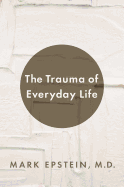
In The Trauma of Everyday Life, psychiatrist Mark Epstein (Thoughts Without a Thinker) offers two main theses: trauma is inevitable but, when handled properly, it connects us to ourselves as more complete individuals.
Trauma, Epstein argues, is indivisible from human experience: "It takes many forms, but spares no one." While events we tend to consider "traumatic"--such as deaths, abuse, or major accidents--do not happen to everyone, we all experience some part of human life as traumatic.
Some schools of thought teach that we ought to move past trauma; others say we ought to rise above it. Epstein finds in Buddhist teachings a method of integrating trauma into our experience of ourselves, generating both a richer inner "self" and a capacity for greater compassion and empathy for others.
The Trauma of Everyday Life explores several Buddhist stories, including those that discuss the death of the Buddha's mother--the first trauma in the Buddha's young life (and one many of us will face as well). Although this episode is often glossed over by many commentators, Epstein interprets it as a key moment in Buddhist thought: the moment at which the Buddha himself is introduced to the trauma that is part and parcel of human existence, and thus the moment from which he must extricate himself to reach peace within himself. From this and other tales, Epstein draws the lesson that trauma needn't be rejected to be conquered; it can instead be integrated, bringing us greater peace with ourselves and each other. --Dani Alexis Ryskamp, blogger at The Book Cricket

